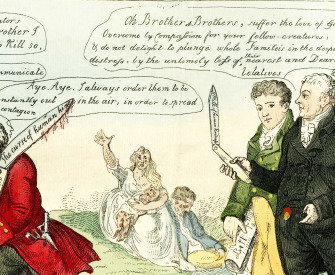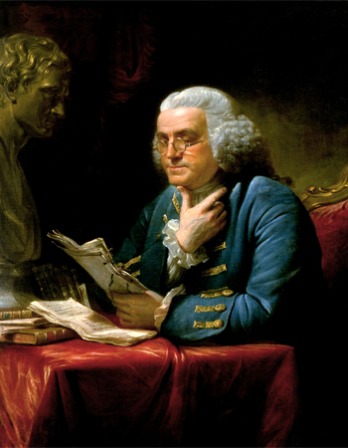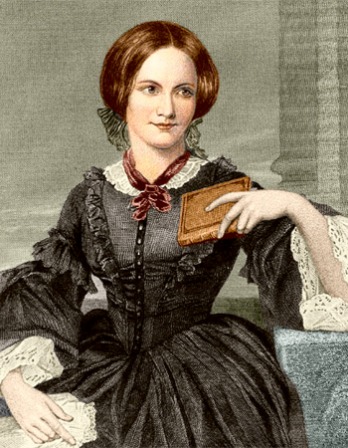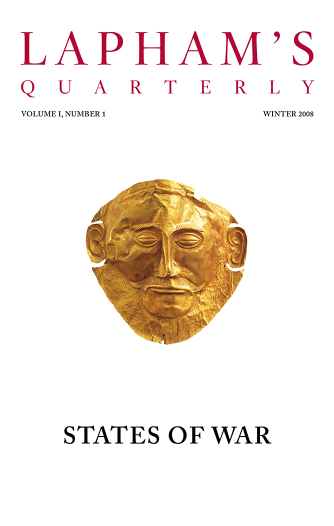Commerce has made all winds her ministers.
—John Sterling, 1843Maken Engelond Gret Ayeyn
How the contest between free trade and protectionism sparked fervor and unrest in medieval England.
By Paul Strohm

Merchant Adventurers’ Hall, York, England, 2016. Photograph by Michael D. Beckwith. Flickr (CC0).
“It happened,” in the laconic words of the coroner’s inquest, “that a certain Giano Imperiale of Genoa lay slain.” The year of his visit to London was 1379, and he had been involved in a street scuffle on St. Nicholas Acton Lane. One summer evening, while Giano was sitting outside his dwelling, a passerby had trod “unwittingly” on his feet, leading to an argument, drawn swords, and Giano’s death. The killer and a confederate were indicted for the crime, but an all-Londoner jury ruled it an accidental homicide.
The matter was not, however, so easily swept under the rug. Giano, it developed, was no casual visitor. He had been admitted to England under letters of safe conduct issued by the king, who was seeking an innovative trading relationship with the Genoese. Giano and representatives of the king had already drafted an agreement allowing Genoese ships to skip the crowded Port of London, discharging and receiving cargo at the deepwater Port of Southampton instead. The product in question was English wool, a commodity so important that, at that historical moment, it accounted for a full third of the total revenue of the land. London merchants and traders had been thriving on duties and profits reaped from their absolute control of the wool trade, and the new arrangement sought by Giano would have blown their monopoly sky-high.
Needless to say, the wool men and their allies who had engineered the murder were intent on hushing it up, and two different London-based juries persisted in declaring the murderers innocent of all charges. The crown eventually moved the trial to Northampton in its quest for a conviction, and new facts were brought to light. It emerged that the scuffle was no accident, but that the murderer “went past Giano Imperiale’s feet and came back three times, on each occasion stumbling over his feet, for the sake of picking a quarrel between them.” Confronted with this and other elements of new testimony, the murderers revealed their true motive, explaining that they were acting on the belief of their masters—members of the London mayoral and trading elite—that “in the event that he could bring his plans to conclusion, Giano Imperiale would destroy and ruin all the wool merchants in London.”
Despite this technical triumph for the crown and its success in obtaining a conviction, the wool merchants prevailed in the end. One of the small-fry murderers was eventually put to death and one was released, but the crime’s architects suffered no penalties or even inconveniences. The wool men had gotten away with murder in defense of their prerogative.
Giano’s killing was one episode in the larger story of international trade and its accompanying rivalries in the later European Middle Ages. The so-called Dark Ages were never as dark as their name would imply; hucksters, peddlers, chapmen, and other minor players had always plied Europe’s roads and dealt their goods. But it was in the fourteenth and fifteenth centuries that high-volume international trading seriously resumed, with trade in wool one of its major drivers. In those centuries, the Port of London alone handled almost a thousand arriving and departing trading vessels a year, and numerous other English ports (including the newly active ports of Dover and Southampton) were claiming a role. Half this activity was devoted to wool, and it generated immense wealth for the realm, conferring fortunes on a small and monopolistic group of men. These successful profiteers were not the sheepherders and shearers of the provinces, nor the merchant sailors who braved the seas, but the entrepreneurial middlemen who collected revenues on exported wool. A close-knit group of at most several hundred men, they formed allegiances and confederations throughout the mercantile establishment that dominated the leading guilds and ran the city of London.
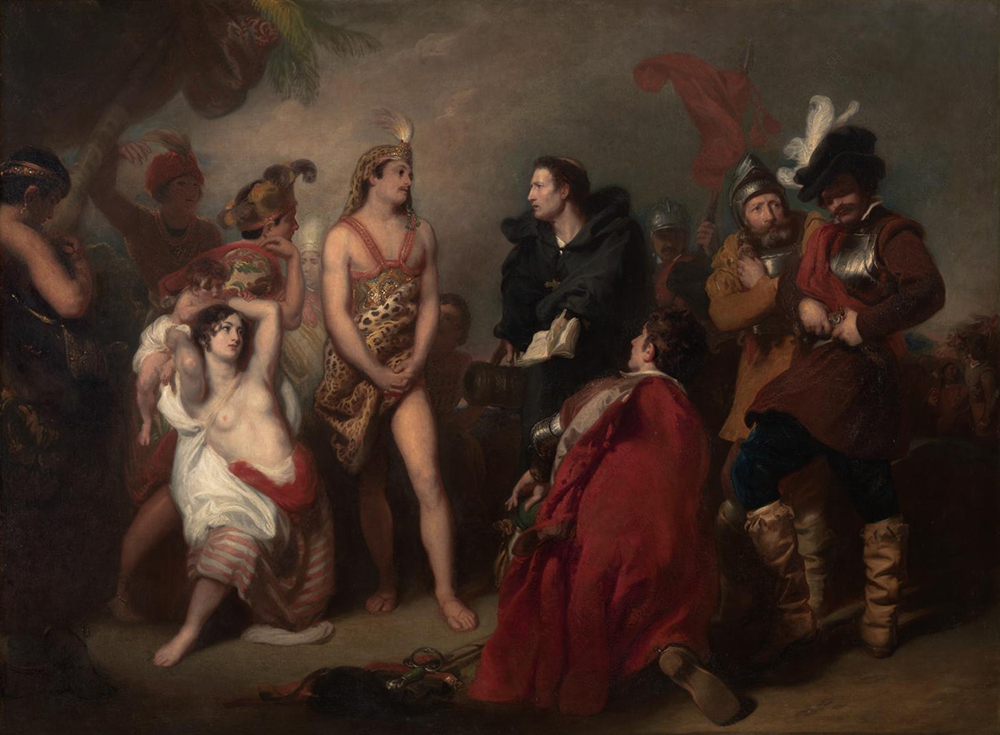
The First Interview Between the Spaniards and the Peruvians, by Henry Perronet Briggs, c. 1827. © Tate, London / Art Resource, NY.
Knowing a good thing when they saw it, these wool merchants secured their privileges by means of favorable arrangements with select European markets, cities with which they concluded binding and mutually profitable arrangements to defend their trading rights. They came to be known as the Staplers, as a consequence of their conservative and self-interested policies. “Staple,” based on estaple—the Old French word for a marketplace or an emporium—epitomized their principal stratagem of forming treaty-based relations with a European trading center and insisting on exclusive dealings.
Of course, the tumultuous and rapidly evolving economic scene of the later Middle Ages opened the door to more than one philosophy of trade. While the conservative wool men abided by the Staple, another and more activist cohort of traders, dealing in cloth and finished wool, was also operating out of London and a hodgepodge of smaller English ports. By the fifteenth century, these merchants had organized and given themselves a name: the Company of Merchant Adventurers. Their chosen name said a great deal about them. The early Merchant Adventurers spurned settled arrangements in favor of new horizons. Unlike their Stapler peers, they preferred far-flung destinations, flexible arrangements, and speculative deals. Their ranks were open to a wide range of aspiring traders and manufacturers with eyes on international markets and products to sell, including mercers (vendors of finished cloth), drapers, haberdashers, and skinners or furriers. Their “adventure” was not so much derring-do or thrill seeking for its own sake but (in the sense of the phrase venture capitalist as we use it today) a readiness to confront economic risk, a preparedness to stake their own capital in the pursuit of profit. Economic historian E.M. Carus-Wilson captured the difference between the two groups when she wrote, “The Adventurer, unlike the Stapler, who went regularly to and fro between England and the English port of Calais, voyaged far afield, east, west, north, or south, wherever he could find an opening.”
The dour Staplers and the more rakish Adventurers and everybody in between were swept into discussions of the risks and rewards of international trade. Their concerns were advanced by English authors and poets who talked and wrote avidly about their scorn for international rivals; their approval of sporadic acts of mayhem directed against foreign competitors; their disapproval of sharp practice; the excitement and even romantic allure of their goods; the convergence of their own interests with those of their emerging nation-state. Participants in the discussion included Geoffrey Chaucer (who spent fourteen years as controller of the wool custom in the Port of London and whose father was a successful international wine trader) and the gentleman lawyer John Gower, his friend and poetic rival. Joining them were other canny observers of this emergent scene: city chroniclers, geographers, even a budding political economist who composed one of the earliest tracts written in English on the subject of commerce, essentially an “England First” manifesto in Chaucerian verse.
Medieval merchants, especially the elite tier of international traders, were great self-imaginers. Elements of chivalric romance could be found in their undertakings: the risks and dangers they endured, the innovative arrangements they introduced, their coveted new products, and their success in bringing them to market. True, these could be imaginary risks, and traders could experience purely fiscal challenges without ever leaving their parishes or the reassuring sound of London’s chapel bells. But even for stay-at-homes, the trading life contained ample mythmaking material—not least of which the sheer agitation of abundant profit through mercantile exchange, the excitement accompanying the free flow of goods across borders and into welcoming hands. Even Gower—a devout Christian who held conservative views on subjects of profit taking and economic exchange—could not wholly resist what might be called the romance of commodities:
God has given his gifts, recognizing
The diversity of different lands.
To one he has given wool, silk to another,
Wine to one, and to another, wheat.
Thus he divides his goods among the lands…
And God ordained the merchantry,
So what was lacking in one land
Might in another land be found.
Long, dizzying lists of products, like unearthed treasures in an Arthurian romance, were a common trope in the literature of the merchant’s trade. The products of different lands (here, Spain) might be lovingly enumerated:
Figs, raisins, wine, muscat, and dates,
Licorice, oil of Seville, and also scarlet dye,
White Castile soap and wax is not in vain,
Iron, wool, woven wool, goatskin, kidskin also—
For lacemakers need both for their trade—
Saffron, quicksilver…
Common, too, were evocative lists of ports of call. Another mercantile poem imagined goods flowing
From Arras, Picardy, Hainault, and Normandy,
Brittany, France, Petowe, and Berri,
Gascony, Gijon, and also Aragon,
Portugal, Spain, and Navarre.
It was no surprise that the merchant’s calling began to assume the gallantry of knighthood. Romance reading among merchants was widespread. The Auchinleck Manuscript, a fourteenth-century compilation that includes eighteen romances written in metrical verse, is an early expression of mercantile and London-based literary culture. In the fifteenth century, the skinners’ guild sponsored Arthurian translations (from French originals into English) for the enjoyment of its members. And England’s first printer, William Caxton, was a prominent mercer, trading in wool and woven cloth, rising to high rank among the Merchant Adventurers and the eventual governorship of the English traders in the Low Countries. His enthusiasm for chivalric literature was such that, upon his return to England, he began producing the first printed editions of many romances, including Thomas Malory’s celebrated Arthurian legend, Le Morte Darthur.
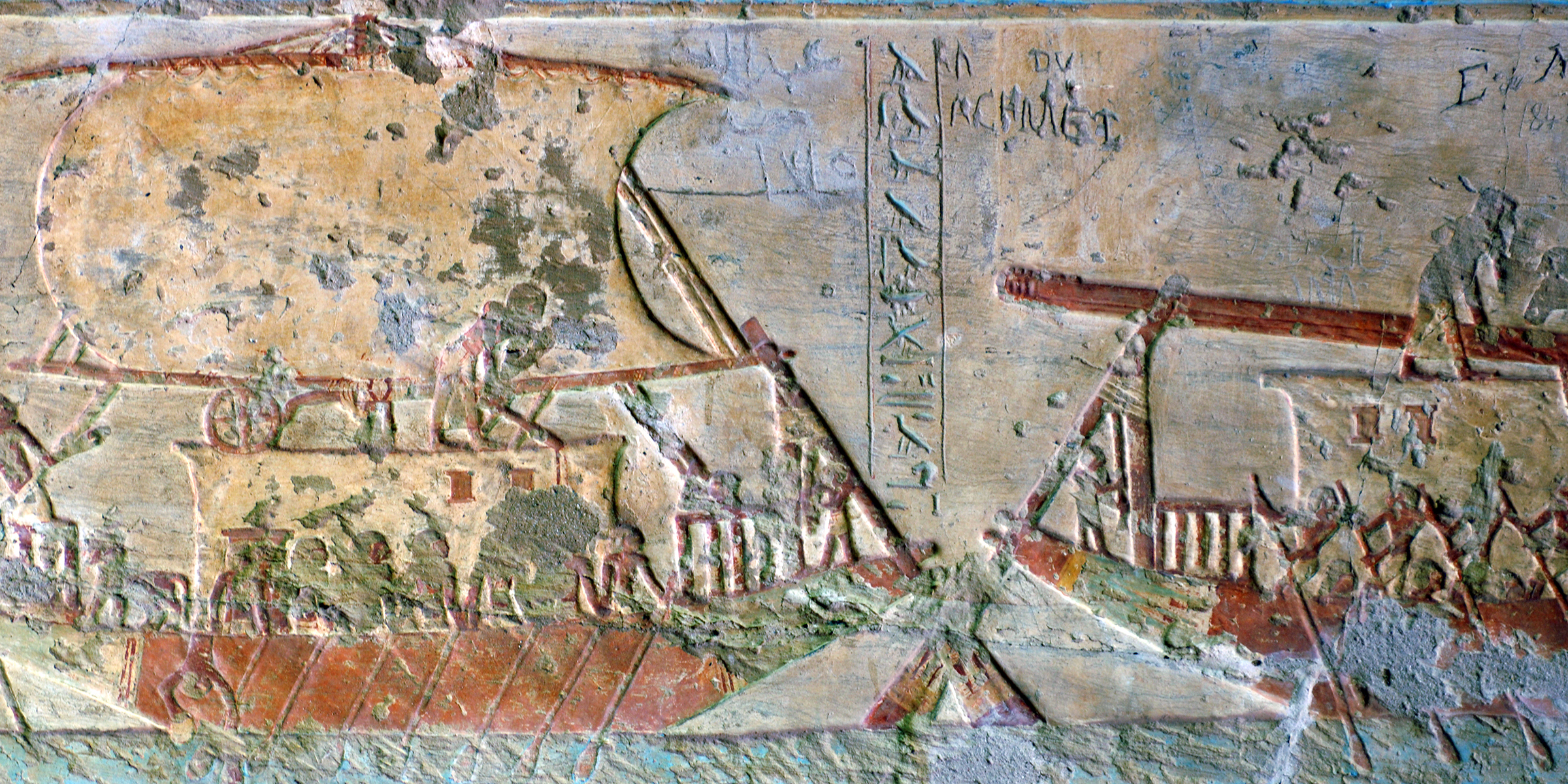
Ships loaded with grain, frieze from the Tomb of Paheri, Egypt, c. 1380 bc. © François Guenet / Art Resource, NY.
Prosperous merchants assumed many trappings of the aristocratic life. London burghers who advanced to the prestigious status of aldermen took up a range of self-glorifying chivalric practices, such as bearing arms and armor and adopting coats of arms. Some of the more socially ambitious purchased country estates and sought aristocratic marriages for their children. Once in a while, a prominent merchant might actually be dubbed into titular knighthood, as when four members of London’s mercantile elite were knighted for assisting Richard II in putting down the Peasants’ Revolt of 1381. But they were still treated as burghers by their contemporaries, and their titles were specific to the occasion rather than hereditary. All this gave rise to possible ridicule, with members of older elites viewing these “new men” as scramblers. Chaucer, in his “Tale of Sir Thopas,” mocked an imaginary bourgeois knight who hailed from the mercantile districts of Flanders and rode about in cordovan shoes, misconstruing every element of the old chivalric codes.
For all the excitement of travel, enterprise, and runaway commodification, this tumultuous new trading scene had its darker side as well, found in restless striving, competition, and severe antagonisms of the sort that befell Giano. Chaucer, whose own mercantile background well qualified him to speak, penned a memorable description of the fears and frustrations of the trader’s life. His “Shipman’s Tale” includes a plea for sympathy by a merchant trader unsettled by a life of competition and pursuit of uncertain results. Distracted by his far-flung enterprises—and humiliated by his wife’s sexual escapades—the chapman (or trader) blurts out,
Of us chapmen…
Scarcely among twelve two shall thrive
Continually, until our lives shall end.
We may well feign cheer and good visage,
Enduring in the world as it may be,
And keep our own affairs in privacy,
Till we are dead, or else be pilgrims,
Or deny the world…
For, evermore, we live our lives in dread
Of loss and fortune in our chapmanhood.
A darker problem still was that for many medieval Christians trade flirted with profiteering, a damnable practice. Gower, while condoning the trade of vital resources among Christian nations, disapproved of commerce for excessive gain. In his Voice of One Crying, he complained about merchants who inflate the value of imported goods, arguing that they set a “double price” and justify their exorbitance by falsely claiming, “That’s what Paris or Flanders has been paying.” Such unscrupulous traders would, he said, “wound Christ for a penny.” In Mirror of Mankind, he took an additional step toward a critique of mercantile practice itself, creating an allegorical character—Fraud—as a kind of supermerchant and international trader.
Everyone has much to say
About a merchant of our present day,
We call him Fraud, all filled with guile…
Fraud buys and sells in Bordeaux,
In Seville and in Paris, too…
Fraud deals in Florence and in Venice,
Trades his wares in Bruges and Ghent,
Pursues his schemes in the noble city
Brutus built beside the river Thames.
Heightened competition for trading rights, aggravated by suspicions of unfair advantage, not only encouraged fraudulent practice but fostered anger against domestic and foreign competitors. Staplers and Adventurers were frequently at strife in the later Middle Ages, muscling into each other’s markets and disrupting each other’s shipping, especially as the market for the Adventurers’ finished cloth began to exceed the Staplers’ export market for raw English wool. But any friction arising between domestic rivals was exceeded by outrage against foreign competition. Xenophobia flourished, especially directed against England’s most prominent trading rivals: the northern Italians, or Lombards (who included, in Englishmen’s minds, the Genoese), who rivaled the English in banking and in the wool trade, and also the Flemings, England’s competitors in the production of finished cloth. Gower particularly had it in for the Lombards, and he directed his greatest outrage against those who came to trade, and even live, in London:
I greatly wonder in my mind
To see them live in our country,
These Lombards. They’ve no business here,
But yet dwell in our country as if
We welcome them; as if they’re
Born and raised with us…
I’ve seen such Lombards come
Like serving lads, in poor attire,
Who, before a year has even passed,
By their deceit and evil schemes,
More nobly have clothed themselves
Than burghers of our own city.
Several thousand aliens—particularly Lombards and Flemings—resided in later medieval London. Some were simply artisans and guest workers, but others were moneymen and traders in pursuit of dealmaking and trading advantage. Worse still, they were highly successful. Foreigners, and especially the Lombards, succeeded in cornering almost half the profits made on English wool. Naturally enough, they became special objects of calumny and violent imagining. The Middle English romance Beves of Hampton, chronicling the deeds of a legendary English hero, nostalgically imagined a time when Lombards could simply and openly be killed in public.
In every street men might see
Lombards in heaps of dead there lie;
Heads and quarters lie in pieces,
Legs cut off by the knees,
Heads with helmets strewn about,
Hands and arms cut off, thrown out,
Dead bodies quartered in three.
Of course, indulging in angry speculation and fantasy mayhem could easily lead to actual violence. Such reprisals did occur amid the turmoil of the Peasants’ Revolt of 1381. Sparked by agrarian and urban workers’ rage against serfdom, the apprentice system, and other forms of exploitation, the revolt provided a perfect cover for violent settling of other scores. In London, resident communities of Lombard and Fleming merchants and traders were among the victims. The court historian Jean Froissart, in his Chronicles, described how the rebels “went from street to street, killing all the Flemings they found in churches, chapels, and houses. None was spared. They broke into many houses belonging to Lombards and robbed them openly, no one daring to resist them.” Another contemporary account, the Anonimalle Chronicle, specified more horrendous crimes: “The commons had it proclaimed that whoever could catch any Fleming or other aliens of any nation might cut off their heads; and so they did accordingly…They went to the church of St. Martin’s in the Vintry and found therein thirty-five Flemings, whom they dragged outside and beheaded in the street.” Even Chaucer alluded (without much apparent sympathy for the victims) to the very recent massacre. When the fox abducts Chauntecleer the Rooster in the “Nun’s Priest’s Tale,” the cry that goes up is compared to the clamor of the aroused rebels in the recent revolt. The poet wrote that the rebel band “never made shouts one-half so shrill, / When they set out to any Fleming kill.”
Within this climate of heightened competition, an anonymous manifesto appeared: the Libel of English Policy. A manual of shrewd strategic practice but also, in effect, a handbook of protectionism, the Libel (or “little book”) first circulated in 1438, a particularly threatening year for English markets and profits. France and Burgundy had formed a damaging alliance, one threatening to English interests in Flanders, and the English continental beachhead of Calais (seized from France a century earlier) was under armed siege. Additionally, a “bullion famine,” or currency crisis, was sweeping Europe as a whole.
Profit is profit even in Mecca.
—Nigerian proverb,The work was addressed to persons of influence, including the members of the king’s Privy Council, and its strategic prescriptions for English trade captured respectful attention and provoked lively discussion among policy makers. It now survives in some twenty manuscripts (with many more, of course, abroad in its day) and in two editions. Written with full mastery of Chaucerian verse forms, ranging stylistically between subtle analysis and unrestrained tavern rant, its mission was to defend England’s markets, alert countrymen to international chicanery, and most importantly, plead for control of the seas in order to regulate commerce in the national interest. “Cherish merchandise,” the author proclaimed, “keep the admiralty / That we be masters of the narrow sea.” That is, maintain sea power and keep the English Channel—by which he meant the trade link between Dover and Calais—to secure an unimpeded flow of duty-free and favorably regulated goods. These special arrangements, all in the English interest, were to be buttressed by English naval power and militarily enforced if need be.
The Libel was neatly divided into sections scrutinizing England’s commercial relations with each of its various trading partners—Spain, Flanders, Portugal, Brittany, Venice, Florence, Iceland, and so forth—along with passages extolling the militancy of earlier centuries, including initiatives like Edward III’s naval assaults on Brittany in the previous century. Along the way, many of the usual targets came in for ridicule. The Flemings, for instance, were such sots that
when two Flemings meet
They’ll make a cask of mighty ale their treat;
So sore they’ll haul and pull away at it—
Believe it or not, they’ll piss right where they sit.
Considerable space throughout was devoted to condemning unfavorable or deceitful practices, such as those of certain Italian merchants who bought wool on credit in England, sold it for gold in Genoa, invested the proceeds for usurious profit in Flanders, and then, after pocketing their gain, belatedly settled their bill back in England. “Thus they will, if you will so believe, / Wipe our own nose with our own sleeve.” English merchants, meanwhile, made the mistake of selling the Italians fine wool and allowing them to weave it into luxury fabrics, when they should be selling them inferior wool and keeping the rest for the benefit of their own cloth-making industry. Such transactions, the author contended, allowed foreign competitors to
bear the gold out of this land,
And suck the thrift away out of our hand:
As the wasp sucks honey from the bee,
And so diminish our commodity.
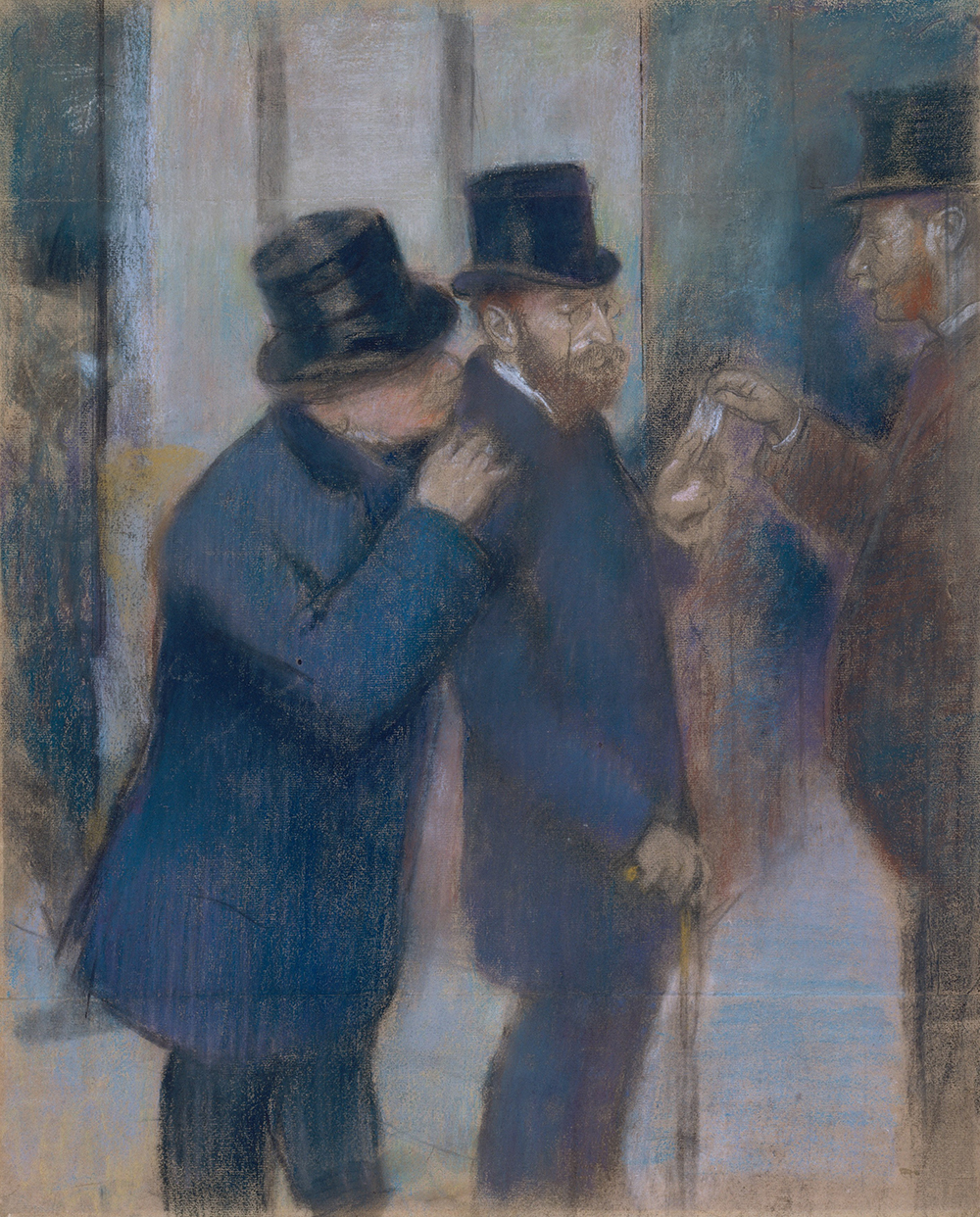
Portraits at the Stock Exchange, by Edgar Degas, c. 1878–79. The Metropolitan Museum of Art, Gift of Janice H. Levin, 1991.
Other grievances were detailed, among them that England was allowing more freedom to foreign merchants than it was receiving in return. The solution, he advised, was to “put them to host”—limit and supervise their activities—or else demand comparable freedoms for English merchants abroad.
What reason is it that we should go to host
In their countries, and in this English coast
They should not so, but have more liberty
Than we ourselves?…
Now see that fools been either they or we,
But ever we have the worse in this country.
The Libel concluded by calling on the council to embrace frankly protectionist policies, and recommended a naval blockade. By patrolling the Strait of Dover, England could interrupt Flemish commerce, thwart competition from the Burgundians, and relieve pressure on Calais. England, the author maintained, had the high ground in a trade war: foreign merchants dealt mainly in nonessential goods—“frippery, niffles, and trifles”—whereas England dealt in essential raw materials like wool and tin that the world would always need. So long as the country could use its sea power to control the flow of trade in its interest and defend the advantageous Dover–Calais axis, it could not fail to thrive.
The author’s advice was never actually implemented and, practically speaking, probably could not have been. At that time England had no standing navy, relying merely on occasional escort services by impressed and lightly armed merchant vessels, and its troops had their hands full around Calais. But the new conservatism, and even jingoism, of the proposals was impossible to ignore.
Richard Hakluyt, the pioneering Elizabethan chronicler of early voyages and discoveries, noted that in the thirteenth century, open-door policies toward foreign traders and “the free trade of merchandise” had been honored. “And what need I,” he wrote, “to put you in mind of King John his favorable safe-conduct, whereby all foreign merchants were to have the same privileges here in England which our English merchants enjoyed abroad in their several countries?” But over the course of the next two centuries, the English began stringently limiting periods of foreign traders’ residence to forty days, demanding all payments for English goods in gold bullion, and subjecting them to unprecedented taxes. Notions of equity and hospitality gradually receded.
Trade is a social act.
—John Stuart Mill, 1859By the time of the Libel’s composition, even the Merchant Adventurers began changing their tune, now showing their own receptivity to protectionist tariffs, armed channel convoys under English naval protection, and relations of exclusive reciprocity with Antwerp as a trading center. The medieval period thus ended with an emphatic shift to the protectionist end of the scale, predicting an England dubious about European entanglement and secure in its pursuit of national goals.
In this way the Libel author and his peers may be seen as Brexiteers avant la lettre, laying early foundations for varieties of economic nationalism now returning to contemporary vogue. Of course, the idea of England basing its prosperity on the export of goods like wool and coal and tin is now centuries out of date, with England long since having become an importer of raw materials. But even though the country no longer produces much in the way of commodities, the idea of a fortress England, self-interested and protectionist, patrolling its own borders, rebuffing overtures from foreign interlopers like poor Giano, still lives on.
